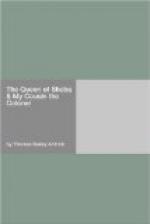A motion to give James Dutton a limited public banquet, at which the politicians could have a chance to unfold their eloquence, was discussed and approved by the Board of Selectmen, but subsequently laid on the table, it being reported that Mr. Dutton had declared that he would rather have his other leg blown off than make a speech. This necessarily killed the project, for a reply from him to the chairman’s opening address was a sine qua non.
Life now opened up all sunshine to James Dutton. His personal surroundings were of the humblest, but it was home, sweet, sweet home. One may roam amid palaces—even amid the halls of the Montezumas—yet, after all, one’s own imperfect drain is the best. The very leather-parings and bits of thread that had drifted from the work-bench into the front yard, and seemed to have taken root there like some strange exotic weed, were a delight to him. Dutton’s inability to move about as in former years sometimes irked him, but everything else was pleasant. He resolved to make the best of this one misfortune, since without it he would never have been treated with such kindness and consideration. The constant employment he found at his trade helped him to forget that he had not two legs. A man who is obliged to occupy a cobbler’s bench day after day has no special need of legs at all. Everybody brought jobs to his door, and Dutton had as much work as he could do. At times, indeed, he was forced to decline a commission. He could hardly credit his senses when this occurred.
So life ran very smoothly with him. For the first time in his existence he found himself humming or whistling an accompaniment to the rat-tat-tat of his hammer on the sole-leather. No hour of the twenty-four hung heavily on him. In the rear of the cottage was a bit of ground, perhaps forty feet square, with an old elm in the centre, under which Dutton liked to take his nooning. It was here he used to play years ago, a quiet, dreamy lad, with no companions except the squirrels. A family of them still inhabited the ancient boughs, and it amused him to remember how he once believed that the nimble brown creatures belonged to a tribe of dwarf Indians who might attempt to scalp him with their little knives if they caught him out after dusk. Though his childhood had not been happy, he had reached a bend in the road where to pause and look back was to find the retrospect full of fairy lights and coloring.




